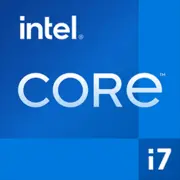Intel Core i7-9700KF

Intel Core i7-9700KF: Review and Relevance in 2025
Despite the release of new generations of processors, the Intel Core i7-9700KF remains a popular choice for budget gaming and working PCs. Let’s explore why it is still relevant, its strengths, and who should consider it.
Key Specifications: Coffee Lake Architecture
The Intel Core i7-9700KF debuted in 2018, and even in 2025, its specifications still hold up well for many tasks.
Architecture and Process Technology:
- Code Name: Coffee Lake (14 nm). Despite the outdated process technology (modern CPUs use 5–7 nm), Intel's 14-nm technology has proven reliable and stable.
- Cores and Threads: 8 cores / 8 threads. The absence of Hyper-Threading limits multi-threaded performance, but for games and applications optimized for physical cores, it is sufficient.
- Cache: 12 MB L3 — ensures fast data access in games and professional applications.
- Base Clock Speed: 3.6 GHz, with a maximum boost frequency of 4.9 GHz.
- TDP: 95 W — moderate power consumption.
- Performance: Geekbench 6 Single-Core — 1659, Multi-Core — 7072. For comparison, the Ryzen 5 7600X (2023) scores around ~2100 in single-core testing but is more expensive.
Key Features:
- Unlocked multiplier for overclocking (indicated by the "K").
- Official support for DDR4-2666 memory, but on motherboards with the Z390 chipset, it can be overclocked to 3200+ MHz.
- Integrated graphics are absent (denoted by the "F"), which lowers the cost but requires a discrete graphics card.
Compatible Motherboards: LGA 1151-v2 Socket
The i7-9700KF is compatible with motherboards using the LGA 1151-v2 socket and chipsets Z390, H370, B365, B360.
Selection Recommendations:
- Z390: Best choice for overclocking (e.g., ASUS ROG Strix Z390-E, MSI MPG Z390 Gaming Pro Carbon). Supports overclocking, PCIe 3.0 x16, USB 3.1 Gen2. Prices in 2025 range from $120 (used) to $200 (new).
- B365/B360: Budget options without overclocking (ASRock B365M Pro4, Gigabyte B360 AORUS Gaming 3). Suitable for basic builds.
- H370: A good middle ground with support for RAID and more SATA ports.
Important: Make sure the motherboard's BIOS is updated to a version that supports the 9th generation Intel CPUs.
Supported Memory: DDR4
The i7-9700KF only works with DDR4. The maximum official frequency is 2666 MHz, but on Z390 motherboards, modules of 3200–3600 MHz can be used (with overclocking).
Recommendations:
- For gaming: 16 GB (2x8 GB) DDR4-3200.
- For work tasks: 32 GB (2x16 GB) DDR4-3000+.
- Examples: Corsair Vengeance LPX, Kingston Fury Renegade.
Limitations:
- No support for DDR5 — a major downside in 2025, as new AMD and Intel processors have transitioned to DDR5.
Power Supply: Power Calculation
With a TDP of 95 W and using a graphics card like NVIDIA RTX 4060 or AMD RX 7600:
- Minimum: 550 W (e.g., EVGA 550 B5).
- Recommended: 650 W (Corsair RM650x, Be Quiet! Straight Power 11).
Tips:
- Choose power supplies with an 80 Plus Gold certification or higher.
- Consider overclocking: when overclocking both CPU and GPU, it’s wise to increase the power by 100–150 W.
Pros and Cons
Pros:
1. High single-thread performance — ideal for gaming.
2. Low heat output — even an air cooler can handle it (e.g., DeepCool AK400).
3. Affordable price — a new processor in 2025 costs $150–200.
Cons:
1. No Hyper-Threading — underperforms in multi-threaded tasks (rendering, streaming).
2. Outdated 14 nm process — higher power consumption compared to 7 nm Ryzen.
3. No support for PCIe 4.0/5.0 and DDR5.
Use Cases
1. Gaming: In 2025, the i7-9700KF still runs AAA titles at high settings when paired with RTX 4060 or RX 7600. For example, in Cyberpunk 2077 (1080p Ultra) — stable 60+ FPS.
2. Work Tasks: Suitable for video editing in Premiere Pro, working in Photoshop, but for 4K rendering, it’s better to go for a CPU with more threads (e.g., Ryzen 7 7700X).
3. Multimedia: Ideal for HTPC builds — low TDP and compact cooling.
Comparison with Competitors
- AMD Ryzen 7 3700X (8/16): Better in multi-threaded tasks (+20% in Cinebench R23) but weaker in gaming (-15% in 1080p). Price: $180–220.
- Intel Core i5-12600K (10/16): 30% faster in multi-threading, but more expensive ($250).
- In 2025: New budget CPUs, like the Intel Core i3-14100F, surpass the i7-9700KF in single-thread tests but fall behind in multi-core.
Practical Assembly Tips
1. Cooling: Even with overclocking, a tower cooler under $50 (DeepCool Gammaxx 400) will suffice.
2. Motherboard: Don’t skimp on VRM — boards with 10+ power phases (e.g., MSI Z390-A Pro) will ensure stable overclocking.
3. Upgrade: If you plan to switch to DDR5, it’s better to choose a more modern platform.
Conclusion: Who Should Consider the i7-9700KF?
This processor is a solid choice if:
- You are a gamer: Looking for a budget CPU for 1080p/1440p gaming.
- Need a PC for office and multimedia: High performance in everyday tasks.
- Have access to cheap components: Motherboards and DDR4 are currently inexpensive.
Target Audience:
- Students, budget-conscious enthusiasts, owners of older PCs with 8th-9th generation Intel wanting to upgrade without changing platforms.
In 2025, the i7-9700KF remains a successful compromise between price and performance for those not chasing the latest technologies but seeking stability and reliability.
Basic
CPU Specifications
Memory Specifications
Miscellaneous
Benchmarks
Compared to Other CPU
Share in social media
Or Link To Us
<a href="https://cputronic.com/index.php/cpu/intel-core-i7-9700kf" target="_blank">Intel Core i7-9700KF</a>